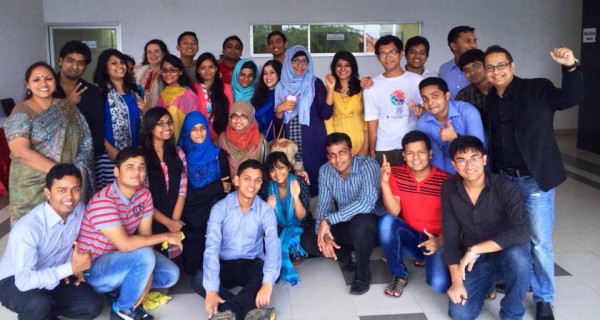UN Secretary General Ban Ki-Moon has asserted that young people are indispensable in the United Nations efforts to “eradicate poverty, contain the spread of disease, combat climate change and achieve the Millennium Development Goals” and has called on UN member states to “increase their investments in young people so they can do more.”
By Arup Barua*
Following that call, UNCT (United Nations Conference on Trade and Development) Bangladesh has embarked on a drive to recognize the hope, expectations and talents of youth in achieving long-term social development through engaging Bangladeshi youths in policy planning and implementation to foster sustainable development.
The induction and skill development training for UNYAP members took place from 27th-30th September, 2014. United Nations Youth Advisory Panel Bangladesh (UNYAP Bangladesh), the forum of youth representatives covering the whole country ranges from age 15 to 30. Thirty UNYAP members were selected through a competitive process by UNCT in June, 2014; among thousands of applicants around 100 were interviewed and finally 30 youths were selected representing different youth organizations and communities in the country.
Inaugural day of the training aimed to bring the members close to each other; to have the articulated expectations of the participants; and fixing out their roles and responsibilities during a 4-day workshop.
Second day started with the recapitulation of the previous day. Following first session was conducted by Mr. Moniruzzaman, Officer In Charge, UNIC Dhaka on ‘Introduction to the UN System’ & ‘UN in Bangladesh’. Mr. Zaman enunciated that currently 23 UN agencies are working in Bangladesh on diverse issues. United Nations embarked its operation through relief in Bangladesh during the period of liberation war against West Pakistan, which named United Nations East Pakistan Relief Operation (UNEPRO). Following the end of bloody war UN started The United Nations Relief Operation in Dacca (UNROD) which was launched by the Secretary-General in December 1971. Later UNROD was replaced by The United Nations relief operation in Bangladesh (UNROB) in April 1973, and UNROB was ended up on 31 December 1973.
Further Ms. Danny from UNFPA conducted a session on UN Theme Group Youth and Adolescent: Annual Work Plan. She presented the Youth- SWAP goals – covering employment& entrepreneurship; protection of rights; political inclusion; education; health and the scope of youths’ engagement in developmental activities.
Later, Mr. Salahuddin Khan from UNDP directed a session on ‘Youth Narratives’ where participants shared their own life stories; particularly focusing on the challenges they have faced in their lives and how they dealt with that situations. This session in general brought out major challenges face by Bangladeshi youths entailing – lack of proper schooling, mentorship, poor quality of education, drop outs, social stigma, early marriage, improper adolescent and reproductive health education, sexual harassment/ violence, communication barriers, financial hardship, scarce job opportunities and some others.
‘Youth as leaders and an entrepreneurs’ episode was jointly conducted by Mr. G. Sumdany Don and Mr. Korvi Rakshand . Korvi shared his struggle in establishing ‘Jaago Foundation’ at the inception and Don directed a motivational workshop how to overcome challenges in entrepreneurship. Sumdany Don ignited the participants in the way to be actuated by the power of positive thinking in every stage of life.
Ms. Noreen Seyerl, Volunteering and Post-2015 Officer, UNDP discussed about volunteerism in the line with post-2015 development agenda. She firmly believes that in a developing country like Bangladesh where resources are very limited, it is volunteerism that clearly makes the difference for the greater society.
The third day was dedicated to developing the governance structure and draft Terms of Reference (ToR) as well holding an election for UNYAP executive body; which was coordinated by Mr. Maruf, UNFPA. The ToR delineates background, purpose, objectives, membership, expected outcomes, coordination mechanism etc. of UNYAP.
Campaign as a tool of advocacy was demonstrated in a separate session by Franklin and Vijaya, Restless Development. Restless Development is a youth-led development agency which is working with a vision where young people taking leadership roles in addressing the most urgent issues facing their country and the world. Members split in four groups presented concept and praxis of campaign; nature, importance, and typologies of campaigns in different contexts with real life experiences.
The governing body of four positions namely – President, Vice President, Secretary and Communication coordinator were elected by a democratic voting system; the election was conducted and organized by UN officials and Restless Development. Each and every panel members cast four votes for four positions. Following an hour of exhilaration the result was published; Tasnim Jara, Abdullah Razwan, Arup Barua and Hitoishi Chakma were elected respectively.
Four-day training program ended up with the evaluation and feedback by both sides – panel members and facilitation team members as well with the promise to drive the change.
The major goals of UNYAP Bangladesh include – to advise the UNCT Bangladesh on the strategic opportunities and necessary actions for addressing adolescent and youth issues; to increase the level and quality of youth participation in planning, implementation and monitoring of UN programs; to advocate the mainstreaming of the youth agenda and a youth responsive approach Common Country Assessment (CCA) and UN Development Assistance Framework (UNDAF).
*Arup Barua, Student, Dept. of Development Studies, Dhaka University & Member, UNYAP Bangladesh
Arup_dds@hotmail.com
Cell: +8801912738591






